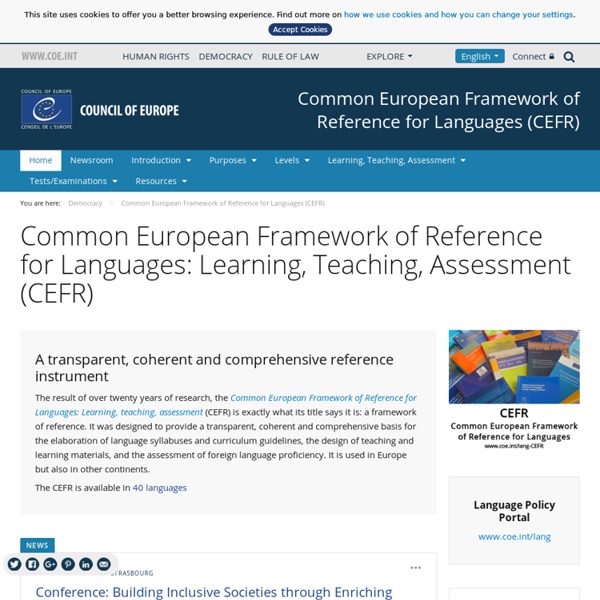



https://www.coe.int/web/common-european-framework-reference-languages
Related: Prépa FLE • Anglais • Inspiring teaching websites • elefonActive learning - Wikipedia Active learning is a teaching method that strives to more directly involve students in the learning process. The term active learning "was introduced by the English scholar R W Revans (1907–2003)."[1] Bonwell (1991) "states that in active learning, students participate in the process and students participate when they are doing something besides passively listening." (Weltman, p. 7) Active learning is "a method of learning in which students are actively or experientially involved in the learning process and where there are different levels of active learning, depending on student involvement." (Weltman, p. 8) It is a model of instruction that focuses the responsibility of learning on learners.
English: Learn Languages for Free Learn English for free online. Download free audio lessons to your computer or mp3 player and start learning English instantly. To learn more languages, please visit our complete collection of Free Language Lessons. Connect with English - WebFeaturing the story of Rebecca, an aspiring singer on a journey across America, Connect With English offers 50 fifteen-minute video programs that will teach English as a second language to high school students, college students and adult learners. To learn more languages, please visit our collection: Learn Languages for Free: Spanish, English, Chinese & Beyond. Support Open Culture
FRAMEWORK - Challenge Based Learning The Challenge Based Learning Framework is divided into three interconnected phases: Engage, Investigate and Act. Each phase includes activities that prepare you to move to the next phase. Supporting the entire process is an ongoing process of documentation, reflection and sharing. Engage – Through essential questioning learners move from an abstract big idea to a concrete and actionable challenge. Bank of supplementary descriptors This page contains links to a variety of documents presenting CEFR-related descriptors that have been produced for other purposes such as European Language Portfolios' models (ELP). Collated representative samples of descriptors of language competences developed for young learners (aged 7-10 and 11-15 years) by Tim Goodier and Tunde Szabo, Eurocentres Foundation. The objective of this document is to provide an overview of how existing descriptors of language competence for young learners relate in content and focus to the calibrated CEFR illustrative descriptors, as a first step towards the possible future development and/or calibration of young learner illustrative descriptors: Updated versions (2018):
The Padagogy Wheel V4.0 … the Next Generation We have just learned that the APPitic website has gone offline and will no longer be maintained. This means the majority of the links on Version 4.0 of the Padagogy Wheel no longer work. We have now released The Padagogy Wheel V4.1 ENGLISH Version with 126 Updated Apps now linked back to the Apple iTunes store. English Profile - The CEFR The Common European Framework of Reference (usually abbreviated to the CEFR or CEF) describes what language learners can do at different stages of their learning. The CEFR is language-neutral, which means that it can be applied to any foreign language learning situation. It was originally designed as a comprehensive reference tool to promote educational transparency and to allow movement between countries for work or study within the European Union. Since its publication in 2001, the CEFR has been translated into 37 languages and its use has spread outside Europe, from Asia to Latin America, as an aid to defining levels for learning, teaching and assessment.
Teach English With This Week in History This Week in History is a fun and interesting reading that is updated every Monday at EnglishClub. You will find it from the EnglishClub homepage. ESL learners can read about a different event that occured in history each week. These short readings can also be printed out and used to inspire a wide range of activities in the ESL classroom. Below you will see one example of "This Week in History", along with a number of ideas on how to use this resource as a basis for various games and skill-building lessons. NB: to help in planning for future lessons, you can find the whole year of weekly events in the This Week in History archive. English Profile - English Grammar Profile The English Grammar Profile allows us to see how learners develop competence in grammatical form and meaning, as well as pragmatic appropriateness, as they move up the CEFR levels. This provides us with typical, world-wide grammar profiles for each level. Like vocabulary, grammatical forms often have more than one meaning. For example, the modal verb 'may' can be used with various meanings at different levels. The EGP teases apart these meanings, and tells us at which level we see learners of English using them correctly and appropriately - here's a sample of the results for 'may':
Don't Miss This Awesome Bloom's Taxonomy Wheel I will be virtually presenting next Friday in MORCE.net conference. My presentation will be on Blooms' Digital Taxonomy. This is one of the major topics of Educational Technology and Mobile Learning which I have profusely written on in previous posts. There is also a separate section in this blog devoted solely to articles and resources on everything teachers need to know about Blooms Taxonomy. Of course my focus is on the digital component of this taxonomy and hence the label Blooms Digital Taxonomy. Compared to the traditional version of Bloom's Taxonomy, vigorous research regarding the use and implementation of Digital Bloom's Taxonomy is still lacking.
Noam Chomsky on the Dangers of Standardized Testing “The assessment itself is completely artificial. It’s not ranking teachers in accordance with their ability to help develop children who will reach their potential, explore their creative interests. Those things you’re not testing.. it’s a rank that’s mostly meaningless. And the very ranking itself is harmful. It’s turning us into individuals who devote our lives to achieving a rank.